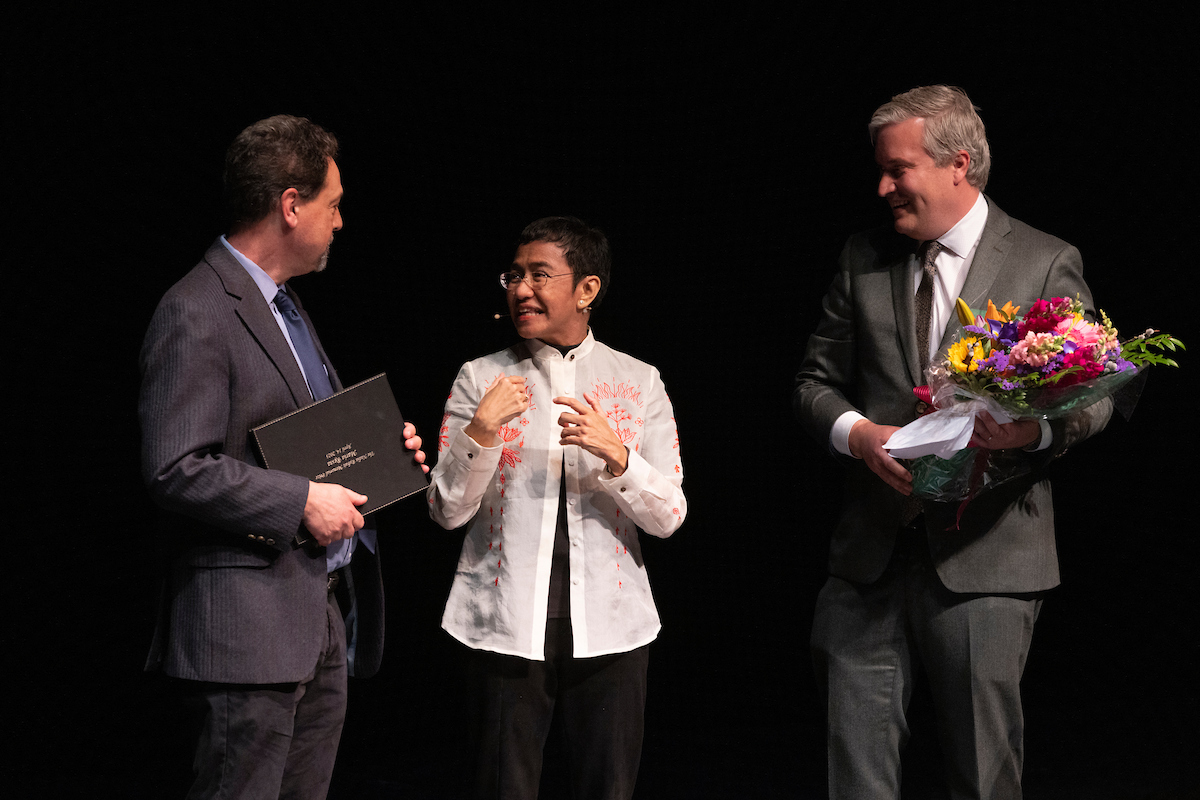Binghamton University awards journalist for efforts in mass atrocity prevention
Nobel Peace Prize winner Maria Ressa receives inaugural Nadia Rubaii Memorial Prize

Be aware of the power you hold in the palm of your hands — the spread of disinformation and hate online can threaten the very basis of democracy and can be a catalyst for mass atrocity.
This was the warning that 2021 Nobel Peace Prize co-recipient Maria Ressa gave during her lecture on April 14 in the Anderson Center. The Filipino-American journalist and co-founder/CEO of Rappler, the largest online news publication in the Philippines, was on campus to receive the first-ever Nadia Rubaii Memorial Prize for her efforts in the fight against online disinformation.
The prize is named after Nadia Rubaii, a former Binghamton professor of public administration and co-director of the Institute for Genocide and Mass Atrocity Prevention (I-GMAP) who died unexpectedly in 2022. Rubaii and Ressa were friends, and Ressa had promised she would come to campus one day.
“Nadia was one of Rappler’s first supporters,” Ressa said. “At our worst moments, she would be waking up at two or three in the morning, your time, to join our live webinars.”
Ressa worked as a journalist for over 36 years, starting as CNN bureau chief in Manila and later opening and managing its Jakarta bureau. In 2012, she co-founded Rappler, and currently serves as its CEO. Within just 18 months, the news site became one of the most prominent sources of news in the Philippines under her leadership. Her work defending freedom of expression and democracy led to her receipt of the Nobel Peace Prize, along with Dmitry Muratov, who has fought similar freedom of expression battles in Russia.
Throughout her lecture, Ressa discussed the real impact that social media can have on politics. Different algorithms on different media platforms have varied impact. The “friends of friends” algorithm that Facebook uses, for example, creates networks that lead to polarization and can push someone further in either direction on the political spectrum. The “clustering” algorithm on YouTube recommends content to the user that could lead to radicalization; this is most evident in fringe far-right conspiracy theorists, according to Ressa.
“They kind of hack our biology,” Ressa said. “They figured out that if you’re angry, or you’re free, or you hate, then you will keep scrolling longer.”
Ressa, who came to Binghamton while on bail pending her appeal of cyber libel charges in the Philippines, discussed how Rappler has been under constant attack by the Filipino government. One week after Rodrigo Duterte, former president of the Philippines, claimed that all journalists were criminals in a State of the Nation Address, Ressa received her first subpoena.
“The Philippine government filed 10 arrest warrants against her, followed by her arrest on multiple trumped-up charges,” said Kerry Whigham, co-director of I-GMAP and an assistant professor of public administration, who introduced Ressa at the ceremony. “She was convicted of cyber libel in June 2020 for a story she didn’t write, edit or supervise, at a time when the law she allegedly violated didn’t exist.”
“The reason you may not trust most organizations, traditional media, is because we have been under intense attack,” Ressa said. “The second reason is that the distribution of the news to you today is on social media platforms that have commodified the news, and corrupted the incentive system for what kind of news we create, in order to get the widest distribution.”
Ressa closed her lecture with a call to action for those in attendance. She reminded the audience of the power each individual has to make a difference, even when things feel out of control.
“We have to become citizens, non-consumers, non-users of these tech companies,” said Ressa. “We need to hold them as accountable as we hold our governments.”

